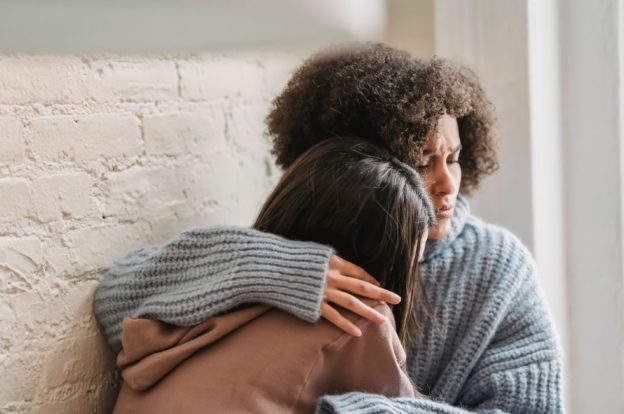When a woman is the victim of violence from an intimate partner, there is trauma on multiple levels. Most obviously is the trauma of the violence against her, but there is also the trauma of conflicted emotions when she is harmed by someone she loved or trusted. That trauma is compounded by the logistics of a relationship, including living arrangements, commitments such as marriage, and especially children. Violence from an intimate partner is like a dream-turned nightmare and often leaves women feeling trapped and alone. How do women cope with intimate partner violence?
The Traumatic Ripple Effect of Intimate Partner Violence
The Centers for Disease Control and Prevention (CDC) defines intimate partner violence (IPV) as “Physical violence, sexual violence, stalking, and psychological aggression by a current or former intimate partner.” Estimates are that one in four women have experienced physical or sexual violence or stalking from an intimate partner during their lifetime.
About 35% of female survivors of IPV endure a form of physical injury, including traumatic brain injury from repetitive blows to the head. These are only the direct, most evident effects of IPV. Women also suffer from trauma and post-traumatic stress disorder (PTSD), depression, anxiety, and chronic illness related to the trauma. IPV impacts children, families, and work as well. IPV begins with one traumatic incident and creates a ripple effect throughout the woman’s life and in the lives of those around her.
Why Escaping Relationships With Violence Is Difficult
For women in romantic or marital relationships when there is IPV, escaping those relationships can be very difficult. In many relationships, there are threats from the abuser or stalker that keep the woman scared into staying. Estimates by the CDC are that over half of the female homicide victims in the U.S. each year are killed by current or former male intimate partners. Many women do not seek restraining orders or are fearful of getting law enforcement involved.
Even emotionally, making the decision to leave a relationship is difficult despite the apparent dangers to a woman’s health and safety. If there is a marriage, navigating an actual divorce makes it that much more complicated. Women who are abused often feel shame or that what happened to them was somehow their fault and are less likely to have the emotional strength to escape the relationship on their own.
How Women Cope With Intimate Partner Violence
How do women cope with violence from their partners? Many women turn to substances. There is a complex link between substance abuse and IPV. Many men who abuse women are more likely to be violent when under the influence of substances. In an effort to cope with the violence, women often turn to substances as a coping mechanism. There are many other factors that come into play in addition to substance abuse, but between 67-99% of women with substance use disorder (SUD) had been victims of IPV, according to the National Online Resource Center of Violence Against Women.
Helping Women Escape From and Heal From Violence
Women need support from multiple agencies, including law enforcement, as well as support from communities, friends, and families to be able to escape relationships with IPV. They need to be safe, they often need financial support to get back on their feet again, and they need emotional support to have the strength to break off the relationship. Women with children need support for their children and also the ability to keep them emotionally and physically safe from the further effects of IPV.
These women will also need medical and therapeutic support to heal from the physical and emotional injuries caused by the violence. Many women who suffer from IPV also have low incomes and little or no access to proper medical or mental health care. There is no straightforward answer to solving IPV; there needs to be a multi-agency community response to support these women.
Healing From Trauma and Addiction After Intimate Partner Violence
One of the most challenging and lasting complications of IPV can be SUD, which is a result of a woman using substances to try to cope with the violence. Healing from the trauma and addiction will require detox and residential treatment with a therapeutic approach to help address the trauma.
Women coming from a relationship with IPV benefit greatly from finding a facility with trauma-informed care. These facilities provide a setting where women can feel safe and avoid being re-traumatized by some common treatment practices that can be harmful to women who have suffered IPV. With the proper support and care and especially the attention to her safety and well-being, a woman who has suffered IPV and has SUD can heal from her trauma and begin her recovery journey.
How do women cope with intimate partner violence? For too many women, the ripple effects of IPV cause them to turn to substances to cope with the violence. Escaping their relationships can be very difficult, so they turn to drugs or alcohol to escape the pain instead, leading to addiction. With adequate support, women can escape these relationships and begin their healing process, including detox and treatment for addiction. The Ho Tai Way – Recovery For Women specializes in trauma-informed treatment for women with substance use disorder (SUD). We provide a safe place for you to find your way again and a calm, peaceful refuge for healing. Located in beautiful, sunny Costa Mesa, California, we offer evidence-based treatment options to create a truly individualized treatment plan. Have you been the victim of IPV and need help healing from your trauma and addiction? Call us today at (714) 581-3974.









